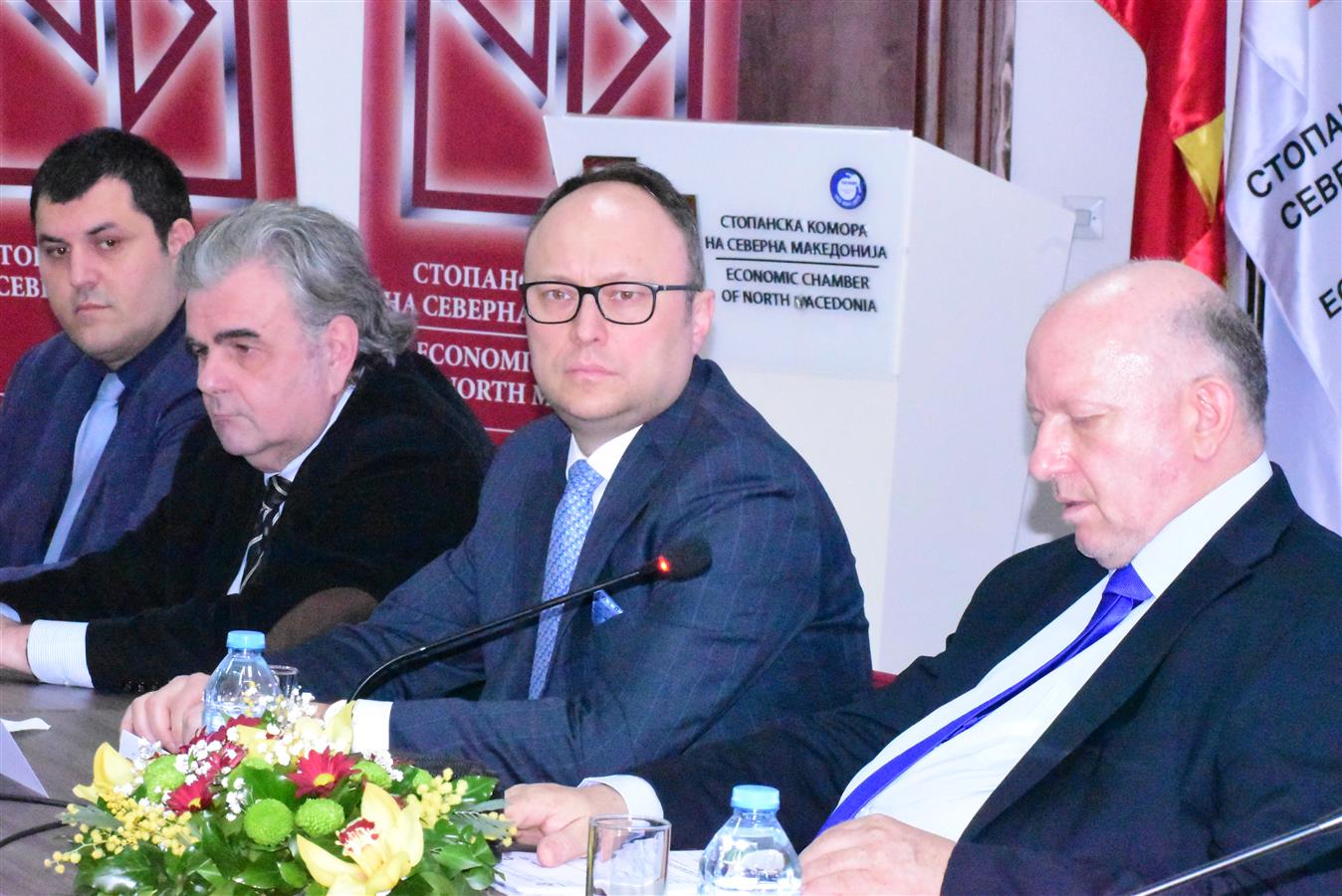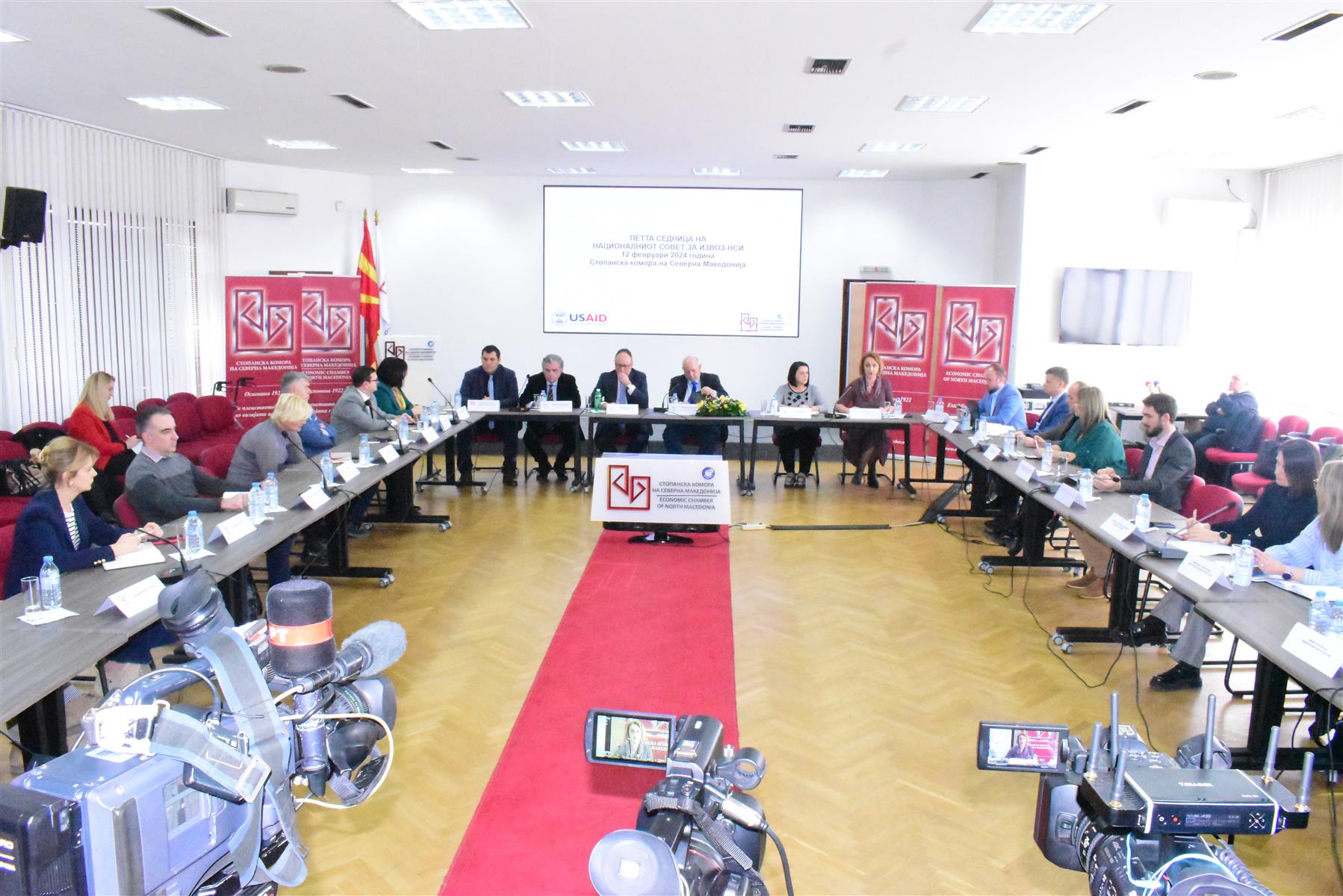The National Export Council (NEC) has intensified its activity and made a radical change in the method of work with measures and tools for establishing exports as a top priority. The fifth NEC session, which was open to the public, saw the strategic priorities of the Council for the coming period highlighted, aimed at encouraging greater support and promotion of companies' export activities and their integration into regional and global systems.
Branko Azeski, President of the Economic Chamber and simultaneously President of the National Export Council, emphasized at the session that Macedonian companies must be competitive, and in order to increase exports and competitiveness of companies, the legal state and rule of law must function. He also pointed out the need to eliminate non-tariff barriers, which are a serious obstacle to increasing exports, increasing the number of strategic markets to which Macedonian companies export, as well as networking more institutions and companies to facilitate exports.
"Our goal is methodologically to move toward implementation and to solve problems with new tools, new instruments that we will introduce. I think it is clear to everyone in Macedonia what exports mean, and that should not be exploited, it's a done deal. Without exports, Macedonia cannot exist further. How we will increase that is the goal of this body. The capacity of the Council over these five sessions has shown that it is up to the task. I think it is a great accomplishment in itself that we know what exports represent and we know what we need to do further in terms of implementation," Azeski said at the session.
The Secretary General of the Council, Jelisaveta Georgieva Jovevska, gave an overview of the initial results of the Council's work and the activities that will be a priority this year.
“To achieve the key component for implementing the goals set by the priority of the Economic Chamber of North Macedonia for exports as a leading activity of the Macedonian economy. This means that synergy and prompt application of measures and activities to support exports are needed, not just repeating that exports are a top priority,” emphasized Georgieva Jovevska.
Georgieva Jovevska provided an overview of what has been accomplished to date and what needs to be accomplished within deadlines. Key activities include:
- An analysis of the export potentials of the Macedonian economy has been conducted by the President of the Exporters’ Club. It serves as a good roadmap for shaping the Council's future policies. Deadline for implementation of analysis findings - ongoing.
- An analysis of measures and subsidies to support the agri-food sector in increasing exports was conducted by a representative from the Chamber’s Agriculture Association. It serves as a roadmap for the necessary institutional input. Deadline for implementation of analysis findings - April 2024.
- The RNM Ministry of Finance presented a document containing information on planned budgetary allocations for export support in 2024. The conclusion is to establish a body that will prepare an agenda for future sessions to ensure deadlines are met. Implementation deadline - April 2024.
- A presentation on export support measures in Western Balkan countries was made by the Western Balkans 6 Chamber Investment Forum (WB6 CIF). It was concluded that a comparative analysis should be prepared in the coming period covering multiple sectors. Implementation deadline - May 2024.
- Inputs were provided by the Western Balkans business community regarding the development of the Growth Plan for the Western Balkans, incorporating ECNM proposals provided during the development of the new Growth Plan. These inputs focus on various initiatives primarily centered on infrastructure, elimination of trade barriers, mutual recognition of trade documentation, accredited laboratories, etc. Implementation deadline for our inputs by institutions - ongoing.
- Our initiatives are included in the Action Plan for the implementation of the Export Promotion Strategy (2024-2027) and are addressed to the Ministry of Economy (part of the proposals include organizing conferences and activities to promote exports, support in conducting training for SMEs to raise awareness of innovations, digitalization, patents, and intellectual property rights; creating an e-platform to facilitate exports, i.e., promoting products and services and business networking, obtaining and sharing information relevant to export activities; organizing specialized training for international trade and other topics related to exports as part of the measure to stimulate development and improve skills and culture for the internationalization of human resources in enterprises). Implementation deadline for our inputs by institutions - ongoing.
- Initiatives from member companies of the Exporters’ Club have been channeled to Invest North Macedonia (ASIPI) related to measures to support the promotion and connection of domestic export companies with foreign markets. Implementation deadline for our inputs by institutions - ongoing.
In the upcoming period, NEC will focus on:
- Support from institutions in various areas/sectors, in general, aiming to increase the export assistance budget through support for trade fair events and marketing activities, as well as planned spending of allocated funds under other programs. Methodologies and measures need to be changed with concrete proposals. Implementation deadline - immediate.
- Presentation of measures to improve exports through tourism reforms is to be made by a representative from the Hospitality and Tourism Association at the Chamber, Skopje. Implementation deadline - accomplished at today's session.
- Institutional expansion of NEC with new members, such as the Ministry of Agriculture, Forestry, and Water Economy, the Ministry of Finance, and others. Implementation deadline - ongoing.
- Conducting visits to institutions and companies. Implementation deadline - ongoing.
- Establishment of the Export Institute (consisting of a Training Center focusing on developing human resource capacities through training and workshops for export-oriented companies, and a Research and Analytical Center focusing on providing services through comparative analyses to support export companies) and Digital Export Platform - Easy Export (a digital solution to facilitate companies' export promotion by providing valuable data and information crucial for international trade operations). Implementation deadline - May 2024.
- Activities related to events aimed at eliminating non-tariff barriers, which pose a serious obstacle to international trade and are agreed to be addressed continuously. For example, issues regarding establishing and implementing programs for mutual recognition of certificates and quality analyses accompanying export goods, or compliance with various technical standards, non-transparent rules and procedures from various inspection and other competent authorities, etc. Implementation deadline - ongoing.
- Initiation, through the Ministry of Economy and the Ministry of Foreign Affairs, of signing new bilateral free trade agreements with those countries that could become strategic markets for Macedonian exporters. Implementation deadline - March-September 2024.
- Networking with companies from the region. The year 2024 is the year in which, led by President Azeski, the Economic Chamber of North Macedonia presides over the ABC (Association of Balkan Chambers). During the presidency of President Azeski and the Economic Chamber of North Macedonia, the focus will be on exports, investments, and infrastructure. ABC is an association of 10 chambers of commerce from the Balkan region (EU members and non-members), which celebrates its 30th anniversary this year. The goal of the Association is to ensure integration and develop economic cooperation in the region. Members of the ABC, in addition to the Economic Chamber of North Macedonia, include the Union of Chambers of Commerce and Industry of Albania, the Bulgarian Chamber of Commerce and Industry, the Foreign Trade Chamber of Bosnia and Herzegovina, the Chamber of Economy of Montenegro, the Union of Hellenic Chambers of Commerce and Industry, the Cyprus Chamber of Commerce and Industry, the Chamber of Commerce and Industry of Romania, the Chamber of Commerce and Industry of Serbia, the Union of Chambers and Commodity Exchanges of Turkey, and the Kosovo Chamber of Commerce. Implementation deadline - May-November 2024.
The National Export Council, as a body, is crucial in the work of the Economic Chamber of North Macedonia.
In the coming period, this body will work toward achieving the goals of export support, including a specific strategy for working with the ten countries we have in our international trade, measures for direct support from the state for export companies through the budget, and finally, a comparative analysis for countries that have achieved visible results in this regard, especially the so-called Asian tigers, in the short term.
|
Azeski: The National Export Council represents a crucial mechanism for public-private dialogue, where for the first time, a private sector individual is appointed as president, rather than someone from the government, which confirms the proper alignment of affairs, especially since this is happening in the export sector, which is the only way for the development of our economy.
|
The National Export Council aims to encourage greater support and promotion of export activities of companies in the Republic of North Macedonia. Apart from the Chamber, it includes representatives from the private sector engaged in various export-oriented activities, as well as representatives from the offices of the President and Deputy President of the RNM Government in charge of economic affairs, the Ministries of Economy, Foreign Affairs, the Directorate for Technological and Industrial Development Zones, the Agency for Foreign Investments and Export Promotion, the Innovation and Technology Development Fund, and the Customs Administration.
|
The National Export Council serves as a national advisory body in regard to creating and implementing policies to advance exports, strengthen the export potentials of the domestic economy, enhance the competitiveness of export-oriented companies, and explore new markets. It was established upon the initiative of the Private Sector Regional Integration Support Activity (PSRISA), implemented in partnership between the Economic Chamber of North Macedonia and the United States Agency for International Development (USAID).
|


